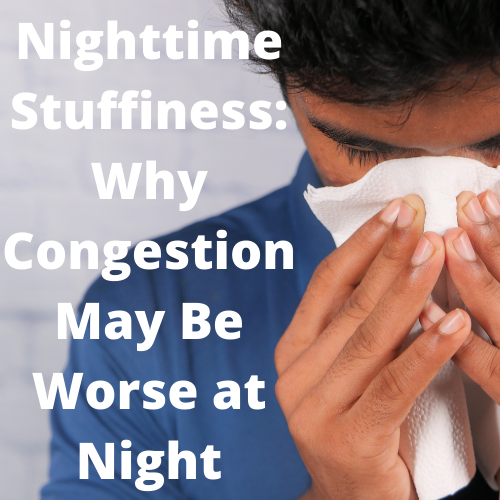Allergies can be the most annoying thing to deal with, especially when you're trying to get a good night's sleep. When you can't breathe out of your nose and you're forced to breathe out of your mouth, you can wake up with dry mouth, and your overall quality of sleep is just not good. Nighttime stuffiness may be worse than your daytime allergies, which can be extremely frustrating. Here is some more information on nighttime stuffiness and what you can do for a better night's sleep.
Why congestion gets worse at night
Nasal congestion, also known as a stuffy nose, is caused by fluid building up in the tissues lining the nasal passages. This shrinks the airway, making it very difficult to inhale and exhale. It's also frustrating because you may blow your nose thinking that's helping, but it isn't since no snot or other exudates are coming out of the actual nasal passage. Then you have a red and raw nose from the tissues, and it's just a very frustrating experience.
This experience may be worse at night because you are too distracted during the day to realize how stuff you are. So, you could theoretically be the same amount of stuffy, but it doesn't become extremely noticeable until you lie down and try to go to sleep, but can't breathe.
However, that is not the whole story. Sometimes lying down does make symptoms worse due to anatomy and gravity. During the day, you are standing and sitting, so gravity drains mucus and gives you an open passageway. However, when you are horizontal, gravity can cause mucous to pool instead of drain.
Blood flow changes and alternate-side nasal congestion
When you lie down, your blood pressure changes. You may have increased blood flow to the upper part of your body, which can inflame vesicles inside of your nose and nasal passages. This inflammation can worsen the congestion that you feel. Increased blood flow during pregnancy can also be a common cause of congestion.
In addition to blood flow changes, there is also alternate-side nasal congestion. Sometimes you may notice that only one nostril is clogged at night. This is caused by the nasal cycle, which isn't a disorder, but simply a normal process. The congestion occurs when a turbinate (a structure along the sinus wall that produces mucus) becomes swollen in one nostril. This blocks the air on that one side. This cycle may switch throughout the day or at night, but it isn't allergies.
Reducing nighttime congestion
The first step in reducing nighttime congestion is to recognize that not all causes of nighttime congestion are allergies. If it' not allergy season, then there may be a different cause, which requires a different management.
After determining, or ruling out, certain causes, you can then determine which treatment option is best for you. Without addressing these issues, you may be at increased risk for severe sleep deprivation, which can negatively impact your daily functioning.
These tips may help reduce nighttime congestion and help you sleep better:
- Elevate your head using pillows or an adjustable mattress.
- Don't eat within a few hours of going to bed or lying down.
- Use a cool-mist humidifier at the side of your bed to try and reduce inflammation.
- Stay hydrated throughout the day.
- Stop smoking.
- If you have other causes of your stuffiness that don't have to do with allergies or inflammation, then it may be time to speak with your healthcare provider about the best course of action.
If you attempt the above tips and still have congestion so bad that it interrupts your sleep, it may be worth it to speak with a sleep specialist. Please click the orange button below to get in touch with one of our professionals today!
Sources:
https://www.verywellhealth.com/why-do-i-get-congested-at-night-1192188


